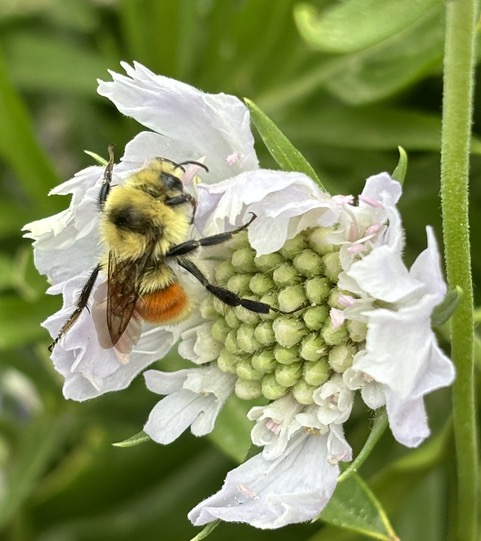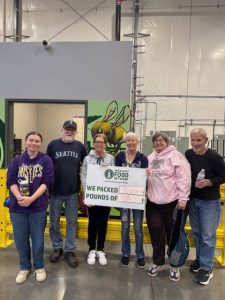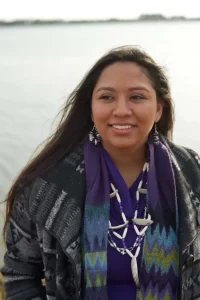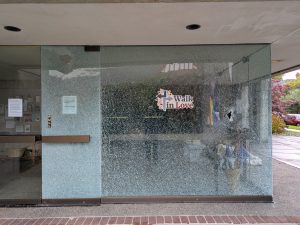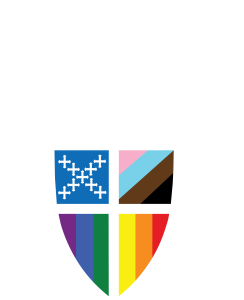A Christ Church Greening Parish Ministry Event for the Season of Creation
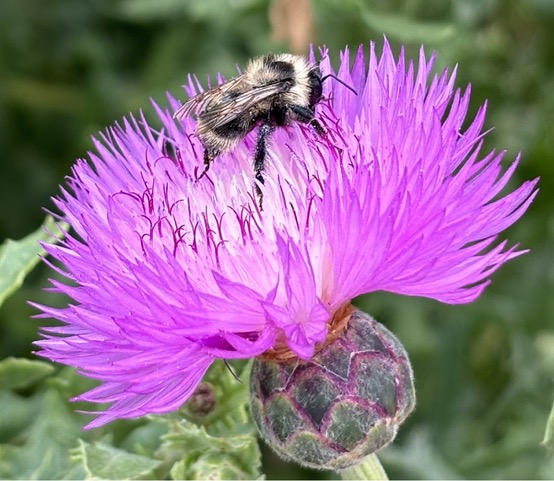
On 21 September we enjoyed and learned plenty from a presentation by Laurie Swan, PhD, DPT, Pierce County Extension Master Gardener and Certified Pollinator Steward. Laurie had promised that we would learn to discern between Washington State native bees and other insects, and how to attract and support native bees in our own gardens. We did indeed learn those things, but also much more, like why pollinators are so important to our very existence, and what the major threats to them are. These issues are crucial to the Greening Parish Ministry as our mission is to become better stewards of God’s creation and to educate ourselves and others as to how we can all protect and restore creatures and their habitats.
Pollinators are animals, like bees, butterflies, and hummingbirds, who feed on the nectar of flowers and in that process transfer pollen from one flower to another. Angiosperms (flowering plants) require pollination to bear fruit, make seeds, and reproduce. Nearly 80% of all flowering plants, including our ornamental and food plants, require the assistance of pollinators to reproduce, and about one out of three bites of food most people take depends on the work of a pollinator. So, pretty important, right? But it’s not just about human needs: pollinators are also necessary to produce fruits and seeds eaten by birds and other creatures. Without flowering plants and their pollinators, our entire ecosystem would collapse.
Pollinator populations are rapidly declining for several reasons, chief among them climate change, habitat loss, and pesticides. But there are things we can do to help our native bees, who are so crucial to the pollination economy. One really important thing is to grow native plants to attract and nurture native bees: native plants and bees co-evolved to be mutually beneficial. Laurie provided cards from Pollinator Partnership showing how to support native pollinators by planting three different species of blooming native plant for each of the three blooming seasons (Spring, Summer, and Fall). She also provided a handout from the Xerces Society with information about native plants for pollinators and beneficial insects in our region, (the maritime northwest) and a chart of her own creation to guide the uninitiated through the process of distinguishing a bee from a wasp or fly.
Besides planting natives, Laurie recommended that we leave space in our soil for insects to burrow, as many bees nest underground. Concrete [cf. recent White House alterations of the Rose Garden] and even mulch can inhibit bees’ access to the soil and prevent them from nesting. And most crucially, stop using pesticides, especially nicotine-based “neonics,” which are deadly to bees and other benign insects. P.S., bees used to be caterpillars, so nurture the caterpillars, too, not just the bees. I must add that the native bees are really cute! Very beautiful little critters.
To complement our pollinator education, members of the Greening Parish Ministry served a vegetarian lunch, with the help of the Sue Beer’s coffee hour contingent. More than forty people attended Laurie Swan’s pollinator presentation.
Resources for Native Bees (courtesy of Laurie Swan)
Book:
• The Bees in Your Backyard, by JS Wilson & OM Carrill (Princeton University Press, 2016)
Washington State University Extension Publications:https://pubs.extension.wsu.edu/
• A Citizen Science Guide to Wild Bees and Floral Visitors in Western Washington (17 pp. downloadable PDF).
• An Introduction to Cavity-Nesting Bees in the Puget Sound Region
• Washington Bumble Bees in Home Yards and Gardens (8 pp. downloadable pdf)
Websites:
Pollinator Partnership: https://pollinator.org/guides_code?c=98604
Washington Bee Atlas: https://agr.wa.gov/departments/insects-pests-and-weeds/insects/apiary-pollinators/pollinator-health/bee-atlas
Washington Native Bee Society: https://www.wanativebeesociety.org/
Washington Native Plant Society: https://www.wnps.org
Xerces Society for Invertebrate Conservation: https://xerces.org/
Photos by Laurie Swan
